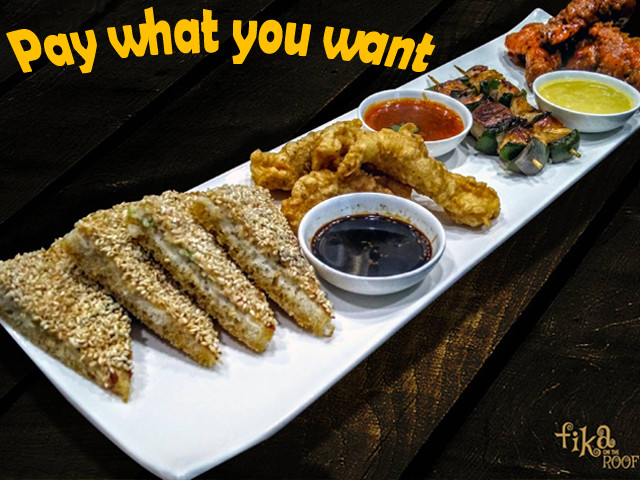
If nothing else, the growing consumer power would generate enough publicity for the restaurant to sustain any losses. A risk well worth taking, one assumes. With the advent of social media the popularity of food groups on Facebook, and Ayesha Mumtaz’ threat, has also given consumers some power in the food industry. Inevitably, many are seen misusing their newly found power by complaining needlessly on social media for every slip up. Food chains are also much more responsive to complaints, and often compensate for bad experiences on their part. But, for many, these bad experiences keep repeating themselves.
As expected with the ‘pay what you want offer, people tried to exploit the offer to its fullest.
A social media tale tells the story of a family of 15 ordering appetisers, entrees, desserts and shakes for each member, and simply paying a thousand rupees for the meal. The disparity in their order, and the bill, makes it seem like it was a deliberate attempt to exploit the restaurant.

I was once given stale bread, during a free breakfast, while staying at the Holiday Inn; as a result, the management did not even charge me for the room I stayed in. There will always be bad eggs but for a ‘pay what you want’ offer to work, the management must be so confident in its food and experience that, more often than not, people will pay adequately.
I am not sure whether it was the experience of dealing with people looking to exploit the offer, or simply the displacement of trust in people that seems to have pushed the restaurant management over the edge. Now, Fika on the Roof is getting reviews with stories where the restaurant staff and management have allegedly been harassing and cajoling customers into paying what they want. If that was to be the case, the restaurant simply should have put a recommended minimum. There is absolutely no need to be rude to the customers.


In a shameful incident on the group, a woman posted a complimentary review of the restaurant, only for the owner of Fika on the Roof to post the entire order on social media, with how much it should have cost her, and how much she ended up paying. The owner even eavesdropped on her conversation over the phone and posted it on Facebook, clearly violating her private space. When the woman removed her post from the group, the owner, who had saved screenshots, re-posted them to publicly shame her. As always, the comments section turned ugly and people started vowing to take revenge from restaurants in general for years of exploiting customers.
Fika on the Roof does not represent restaurants in general.
While I have personally never been there, and hence, cannot speak about the experience or the food, I did applaud their attempt at this experiment. However, the comments from the owner of the restaurant on Facebook reek of elitism.
There are only a handful restaurants in the city whose food deserves the exorbitant prices. I’ve paid Rs750 for a bag of Doritos advertised as Nachos on the menu, Rs550 for four K&Ns mozzarella sticks refried, upwards of a thousand for a frozen burger patty simply microwaved and served, all in the name of fine dining.
Restaurant owners hardly seem to be food connoisseur, instead restaurants are purely a business venture; the food itself following well below on the priority list. This is why you barely see restaurants employ chefs; instead you have a series of line cooks with recipes; cooks who are underpaid and easily replaced. Around the world, restaurants are known for their chefs and I am sure that most of you cannot name a single chef for the restaurants you frequent. A proper chef is seen as a luxury in the cut throat restaurant business.
Here, however, it is common for chefs to be hired only to be disposed of after a year or so, once the regular staff has acquired sufficient training. This is why you see such a stark drop in quality at restaurants after a year or so of operating. As a result, everything tastes the same everywhere; the same bland mixture of recipes floating around the entire city. And the lack of entertainment options in the city means there will always be demand for eating out, which allows restaurants to charge what they want for ‘food’.
Food finds itself in quotation marks because after seeing the Punjab Food Authority post pictures of well reputed fine dining eateries in Lahore, I am not sure what we serve qualifies as food at all. While social media has made everyone in Pakistan a food critic, those using the platform innocently (as in the example above), also become targets of our judgemental mind-sets.
This offer may have been the first chance for a lot of families to give their loved ones a fine dining experience, whilst paying as much as they could afford. If they were unable to pay more, they decided to return the favour in gratitude on Facebook. Ironically, in response, the owner turned around to publicly berate them for doing so.
We judge people for fighting over discounts on Black Friday, without knowing their story. Without wondering what that discounted toy/dress might have meant to them, for them to fight over it.
If Walmart mistakenly puts the decimal in the wrong place and offers a PlayStation for $35.00 instead of $350.00, they will have to sell it for $35 to those who bought it. In the same way, if you have advertised an offer, and for whatever reason a consumer wants to avail it, you have an obligation to honour it. That does not mean you can castigate your customer for availing the offer but not doing so the way you would want them to. If I can recall correctly, the offer, after all, was ‘pay as you want’ and not an implied ‘pay what you want but suffer the consequences if you don’t pay what we want’. That would be a very inconvenient marketing strategy.



COMMENTS
Comments are moderated and generally will be posted if they are on-topic and not abusive.
For more information, please see our Comments FAQ